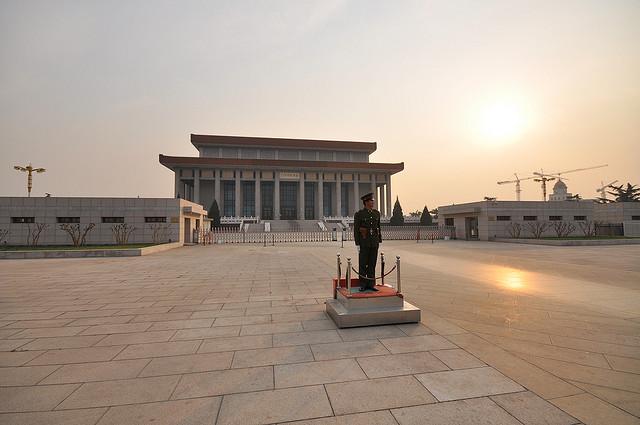Mao now
Posted By Ross Terrill on May 23, 2013 @ 06:00
 [1]
[1]Mao Zedong is the only 20th dictator to have a resurgence of life-after-death that is largely benign. A heavy influence on the 20th century, Mao was a major force in the history of Communist ideas and rule, and will be a great name in Chinese history. As a man of supreme power also possessing a doctrine, he is arguably unmatched in Chinese history. After successfully uniting China under his CCP in 1949, and following the Soviet model, he later pushed utopian policies culminating in the appalling Cultural Revolution of the 1960s. Then he surprised the world again by welcoming anti-Communist Nixon to Beijing in 1972, transforming a bipolar world into a triangle, greatly to the disadvantage of Moscow.
Chinese compare Mao with the hardline emperor Qin Shihuang (think terracotta soldiers) of two millennia ago. Westerners compare him with 20th century authoritarians Stalin and Hitler. But in the four decades since he was laid in a crystal box—displayed still at Tiananmen Square in the heart of Beijing—Mao’s ‘life after death’ has nothing in common with the posthumous fate of Stalin and Hitler.
Yes, Deng Xiaoping criticised Mao, but did not vilify him as Germans did Hitler, or denounce him as Moscow did Stalin. Deng declared Mao 70% correct and 30% mistaken, hoping to forestall further perilous debate; meanwhile, he subtly dismantled Mao’s leftism and focused on economic development. He summed up his task-orientation: “I don’t care whether the cat is black or white, as long as it catches the mouse”. Mao lived long enough to be the ‘Marx-Lenin-Stalin rolled into one’ of the Chinese Revolution. Deng needed just the Lenin part.
But the departed tyrant, to Deng’s irritation, experienced a life after death among Chinese farmers and youth, especially taxi drivers who hung a photo of him on the steering wheel to ward off accidents. Department stores used a model of Mao to display silk pajamas. Nightclub singers crooned songs that cited Mao’s words. Farmers clutched a Mao image as they fended off flood waters.
Some of this was nostalgia for Mao that reflected disappointment with Deng. Portraits of Mao printed for public sale leapt from 370,000 copies in a couple of years to 23 million and soon to 50 million. In Karaoke clubs young people enjoyed songs in praise of him, and even Mao temples appeared in the southeast.
Only once since 1976 has Mao been needed politically. Post-Tiananmen, the government plastered walls with Mao quotations and revived the heroic Lei Feng myth (“I am a cog in the machine of Chairman Mao’s Communist Party”). However, this phase was aborted by the collapse of the Soviet Union and Deng’s ensuing decision to cancel the leftist surge and promote stock exchanges.
After Deng died in 1997, new leader Jiang Zemin sought to place himself alongside Mao and Deng as a third milestone on China’s march to 20th century greatness. He associated himself with Mao’s grandson Mao Xinyu at the time of the centennial of Mao’s birth, to unveil a ten-meter-tall bronze statue of the Chairman. But no public enthusiasm was evident.
Today Xi Jinping quotes Mao approvingly, but the CCP mentions him less. The giant of 20th century China wafts into folklore, famous there like the Yellow Emperor, the Goddess of Mercy and other near-mythical figures.
The Olympic Games of 2008 seemed a set-back for Mao’s life-after-death. Many foreigners and maybe many Chinese wondered at the mention of Confucius but not Mao in the opening and closing ceremonies. Was it because Mao was a bone-deep Chinese nationalist, while the Olympic Games was about globalisation as well as about China?
Some say leftism could one day resurge in China under a Mao banner in the name of national unity, Chinese cultural pride, and economic equality. Mao’s grandson and thousands of activist intellectuals praise the Cultural Revolution on ‘Utopia’ and other websites. Others foresee a post-communist China falling into disorder, as happened in parts of the former Soviet Union, and Mao pressed into the service of fascism in the name of order, heroic leadership, and national pride.
If the 21st century is China’s, Mao may be seen as founder of a Golden Age. If China meets major trouble in trying to reconcile a new economy with a little-changed political system, he might be blamed for the entire communist experiment. Either way he might be viewed as a populist dictator with various strands to his thoughts, including anarchism, Confucianism, Marxism, Daoism, and fascism.
A Chinese tradition exists of leaders moving back and forth between real life and legend-dom. If smokers become a despised minority in 20–30 years, they may rally around the memory of Mao as a patron saint to validate their liking for cigarettes. Already, tourists to Jinggangshan mountains, a Mao base, toss unlit cigarettes onto Mao’s old wooden bed in remembrance of one who loved to smoke. This impulse has little to do with the issue of smoking and health, of course, but expresses a nostalgic affinity, attractive to people half-anxious at their smoking, across the boundary between today’s world and an ethereal world.
Last year I observed youth dining in a ‘Cultural Revolution-style’ café of rough-hewn tables with Mao quotations on the wall while chatting about sex and the stock market. In rural China the departed giant means more: a flawed emperor who remains a benign father figure. For the Communist Party, Mao still is serious business, a Lenin who is the on-going legitimation for its grip on power.
Ross Terrill of Harvard’s Centre for Chinese Studies is a visiting international senior fellow at ASPI. His biography of Mao is well known in China. Image courtesy of Flickr user Jorge Lascar [2].
Article printed from The Strategist: https://aspistrategist.ru
URL to article: /mao-now/
URLs in this post:
[1] Image: https://aspistrategist.ru/wp-content/uploads/2013/05/4475525297_cc56026079_z.jpg
[2] Jorge Lascar: http://www.flickr.com/photos/jlascar/4475525297/in/photostream/
Click here to print.